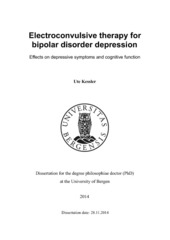| dc.contributor.author | Kessler, Ute | en_US |
| dc.date.accessioned | 2014-12-10T13:32:13Z | |
| dc.date.available | 2014-12-10T13:32:13Z | |
| dc.date.issued | 2014-11-28 | eng |
| dc.identifier.isbn | 978-82-308-2810-6 | en_US |
| dc.identifier.uri | https://hdl.handle.net/1956/8892 | |
| dc.description.abstract | Background: Treating the depressive state of bipolar disorder (BD) is challenging. Pharmacological treatments often have poor outcomes. Electroconvulsive therapy (ECT) is generally considered to be the most effective acute treatment, but documentation is lacking. ECT was for decades a controversial treatment, mainly due to possible long-lasting effects on memory and other neurocognitive functions. BD itself is associated with neurocognitive impairments, and there are concerns that these might be worsened by ECT. Aims: The overall aim of the thesis was to compare the effects of right unilateral (RUL) ECT and algorithm-based pharmacological treatment (APT) on depressive symptoms and cognitive function in treatment-resistant BD depression. Methods: The thesis is based on a multicenter, randomized controlled trial that was carried out at seven acute psychiatric in-patient clinics throughout Norway and included a total of 73 BD patients with treatment-resistant depression. The patients were randomized to receive either ECT or APT. ECT was administered in three sessions per week for up to six weeks using RUL electrode placement and brief-pulse stimulation. The neurocognitive function was assessed with the Measurement and Treatment Research to Improve Cognition in Schizophrenia Consensus Cognitive Battery (MCCB), and retrograde memory for autobiographical events was assessed with the (Columbia) Autobiographical Memory Interview–Short Form (AMI-SF) before and shortly after the trial. Depressive symptoms were assessed with the Montgomery-Åsberg Depression Rating Scale (MADRS) as the primary outcome, and the Inventory of Depressive Symptomatology–Clinician-rated, 30-item version (IDS-C30) and the Clinical Global Impression for Bipolar Disorder (CGI-BP) as secondary outcomes. Results: Neurocognitive impairments were evident in BD depression inpatients within all MCCB domains, more so in BD type I than in BD type II. Higher age was associated with greater neurocognitive deficits compared to age-adjusted published norms. Linear mixed-effects modeling analysis revealed that ECT was significantly more effective than APT. The mean MADRS score was 6.6 points lower in the ECT group than in the APT group (standard error=2.05; 95% confidence interval=2.5–10.6, p=0.001). The secondary outcome measures showed similarly significant results, with the mean IDS-C30 and CGI-BP scores being 9.4 and 0.7 points lower, respectively, in the ECT group. The response rate was higher in the ECT group than in the APT group (73.9% vs 33.3%, p=0.014), but there was no significant group difference in the remission rate (34.8% vs 28.6%, p=0.75). The times to response and remission did not differ significantly between the ECT and APT groups. Shortly after the treatment trial both groups showed improvements in all MCCB domain scores, with no significant differences between the treatment groups. Improvements in neurocognitive performance after treatment were significantly correlated with reductions in depression ratings. The AMI-SF score was significantly lower (based on consistent answers from pre- to posttreatment) in the ECT group than in the APT group (72.9% vs 80.8%, p=0.025), indicating reduced consistency in autobiographical memory after ECT. Conclusions: A large proportion of patients with treatment-resistant BD depression exhibited global neurocognitive impairments with clinically significant severity at baseline. ECT was more effective than APT in treating treatment-resistant BD depression. The response rate was higher in the ECT than in the APT group. The remission rates were modest, with no differences between the treatment groups. General neurocognitive function was unaffected by RUL ECT and positively related to improved mood in BD depression, however autobiographical memory consistency was reduced in patients treated with ECT. These findings suggest that ECT is an effective treatment method in treatment-resistant BD depression and can be used without comprising general neurocognitive function, although the reduced autobiographical memory consistency in the ECT group is a finding that requires further investigation. Clinicians should be aware of the severe neurocognitive dysfunction that can be present in treatment-resistant BD depression independently from ECT treatment. | en_US |
| dc.language.iso | eng | eng |
| dc.publisher | The University of Bergen | eng |
| dc.relation.haspart | Paper I: Kessler U, Schoeyen HK, Andreassen OA, Eide GE, Hammar Å, Malt UF, Oedegaard KJ, Morken G, Sundet K, Vaaler AE: Neurocognitive profiles in treatment-resistant bipolar I and bipolar II disorder depression. BMC Psychiatry 2013, 13:105. The article is available at: <a href="http://hdl.handle.net/1956/8141" target="blank">http://hdl.handle.net/1956/8141</a> | en_US |
| dc.relation.haspart | Paper II: Schoeyen HK, Kessler U, Andreassen OA, Auestad BH, Bergsholm P, Malt UF, Morken G, Oedegaard KJ, Vaaler AE: Treatment resistant bipolar disorder depression – A randomized controlled trial of electroconvulsive therapy versus algorithm-based pharmacological treatment. The article is not available in BORA. | en_US |
| dc.relation.haspart | Paper III: Kessler U, Schoeyen HK, Andreassen OA, Eide GE, Malt UF, Oedegaard KJ, Morken G, Sundet K, Vaaler AE: The effect of electroconvulsive therapy on neurocognitive function in treatment-resistant bipolar disorder depression. J. Clin. Psychiatry 2014, 75(11):e1306–e1313. The article is not available in BORA due to publisher restrictions. The published version is available at: <a href="http://dx.doi.org/10.4088/jcp.13m08960" target="blank">http://dx.doi.org/10.4088/jcp.13m08960</a> | en_US |
| dc.title | Electroconvulsive therapy for bipolar disorder depression. Effects on depressive symptoms and cognitive function | en_US |
| dc.type | Doctoral thesis | |
| dc.rights.holder | Copyright the author. All rights reserved | |
| dc.identifier.cristin | 1169874 | |
